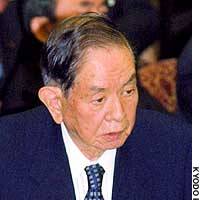Bank of Japan Gov. Masaru Hayami on Tuesday rejected calls to try to drive the value of the yen down, saying Japan would not be able to achieve that goal alone and that it would spark "Japan selling."
"If Japan tried to guide the yen lower and started selling the yen, it would be viewed as the start of 'Japan selling.' Is that what you want?" Hayami asked at a House of Councilors Budget Committee session when asked about the nation's foreign-exchange policy.
"Even if we did something to a certain extent with the yen and the dollar, it would not be maintained," Hayami said, referring to yen-selling, dollar-buying intervention. "We cannot think about this from the viewpoint of Japan alone."
Finance Minister Masajuro Shiokawa indicated in the same session that he favors a weaker yen.
"Our basic idea is that it would be favorable for the foreign-exchange rate to move closer to 'purchasing power parity' " between Japan and the United States, Shiokawa said, referring to the yen-dollar rate.
Purchasing power parity is the idea that currency exchange rates should be at a level that would eliminate price differences between countries.
However, currencies are traded like any other commodity and their value is determined by supply and demand. Since Japan has a huge trading surplus with the U.S., there is a correspondingly large demand for the yen when exporters bring their earnings home.


















With your current subscription plan you can comment on stories. However, before writing your first comment, please create a display name in the Profile section of your subscriber account page.